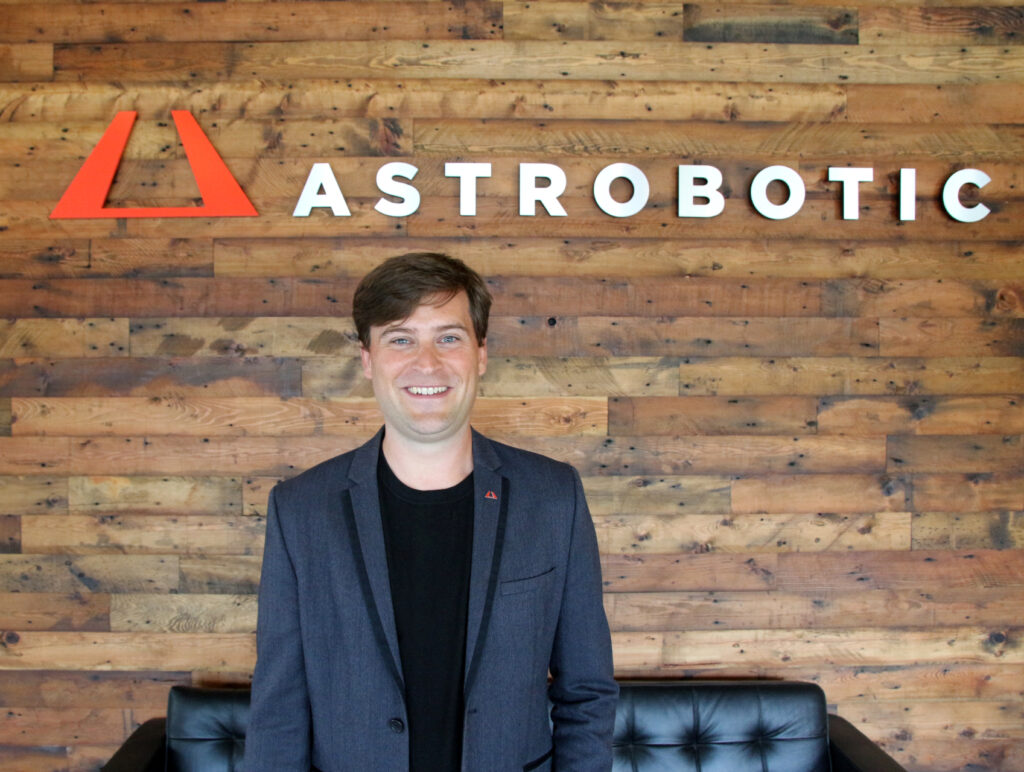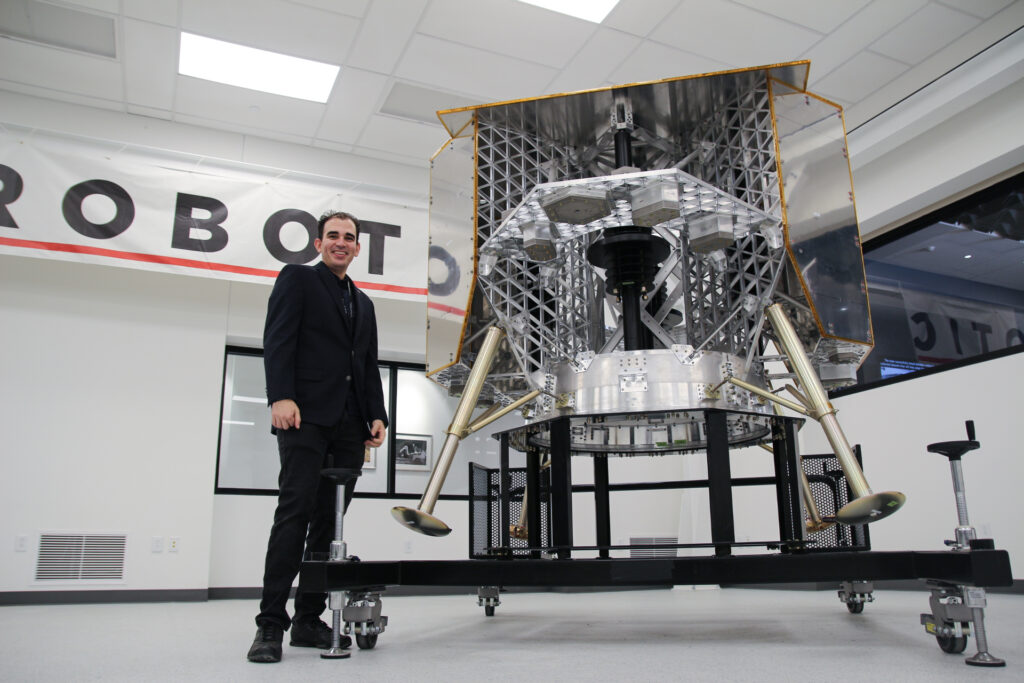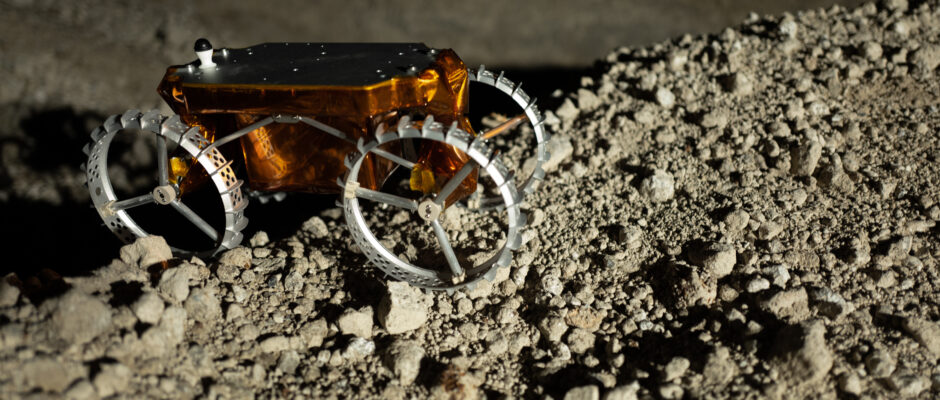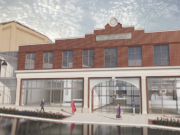Houston, Cape Canaveral…and Pittsburgh? Astrobotic, a space robotics company founded out of Carnegie Mellon in 2007, is putting Steel City on the map and on the moon. Its new headquarters opened in October in the Manchester neighborhood.
“We wanted to be close to downtown, and close to Pittsburgh proper, and all of that has to do with what we’re doing as a space company,” says CEO John Thornton of new 47,000-square-foot complex, which Astrobotic announces as “the largest private facility in the world dedicated to lunar logistics.” Besides appreciating great quality of life for his Pittsburgh employees, Thornton wants the city “right there to witness and experience the thrill of spaceflight with us.”
That includes Astrobotic’s Peregrine Lander, slated for launch in 2021, which Thornton calls “most likely the first robotic moon mission from the U.S. in 50 years,” not to mention the first time Pittsburgh will send a spacecraft to the moon. (There will be no human astronauts; the craft will be piloted right from Manchester).

Astrobotic develops and builds computing systems, lunar landers, and rovers contracted to carry supplies, equipment, and instruments supporting research in space by companies, governments (think NASA and other agencies overseas), universities, nonprofits, and individuals.
Pittsburgh’s space boom is launching thanks in part to a $6.9 million loan from the Strategic Investment Fund (SIF), a private-sector gap financing initiative that got started under the Allegheny Conference on Community Development in 1996 to boost job creation, community development, and the elimination of blight. SIF has provided $165 million in financing to 63 projects, powering more than $1 billion of development in the greater Pittsburgh region.
“It’s really saying, ‘Where do we see the future needing to be? Where do we see the opportunity?'” says Allegheny Conference CEO Stefani Pashman of SIF’s increasingly targeted investments. The Astrobotic headquarters appealed to fund leaders not just because of the boost to the city’s reputation as a world-class destination for robotics and the thrill of Pittsburgh-made tech in space, but because of its location in Manchester.
The neighborhood is now home to a space center that is building landers to go to the moon. There’s nothing we can’t do as a city and as a neighborhood.CEO John Thornton, Astrobotic
The Manchester neighborhood dates to the early 19th century when it boomed as an industrial and residential center, home to Pittsburgh Locomotive and Car Works, Pittsburgh Brass Company, and many others. That history is still visible in the diverse and opulent architecture of the area’s homes. It was always a melting pot, host to communities with English, Irish, German, Jewish, and African American roots. The area declined in the early 20th century as the growing suburbs drained residents away and rising industry in the city center drew population out of Northside neighborhoods, a trend exacerbated by the arrival of Route 65 in the 1960s, dividing the community’s business and residential sections.
“They’re trying to invest in the historic neighborhood of Manchester and help provide community development impact,” says Pashman of why the Astrobotic investment was attractive.
In recent years, SIF has increased its focus on projects that promise to increase equity in the region, including an eye to affordable housing in any proposed residential or mixed-use development, and prioritizing the hiring of contractors from marginalized communities.
According to Pashman, SIF has gotten bolder with its investments in recent years, and the $6.9 million that went to Astrobotic (one of the fund’s largest loans ever) demonstrates that.

“We were looking around for opportunities to get a loan against the building, because buying and redeveloping in cash is difficult,” explains Thornton. “We’re too young and undeveloped for traditional bank loans.”
Dollars from SIF closed the financial gap to complete the headquarters, which just opened its Phase 1 portion. Phase 2 will be finished in summer 2021, Thornton estimates.
The CEO looks forward to offering a range of tours and educational programming, built into the vision for the facility from the start — he says the community should look out for news on this front in future. He also appreciates being just a few blocks away from the Carnegie Science Center, which could become a natural partner. And he notes that Astrobotic employees are poised to spend big on local housing and in local businesses; the company is hiring.
But the “really important” impact is “inspiration,” adds Thornton. “The neighborhood is now home to a space center that is building landers to go to the moon. There’s nothing we can’t do as a city and as a neighborhood.”
ALAINA JOHNS is a Philadelphia-based freelance writer and the Editor-in-Chief of BroadStreetReview.com, Philly’s hub for arts, culture and commentary.



